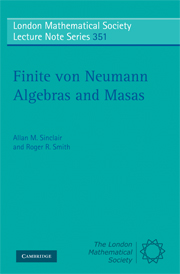Book contents
- Frontmatter
- Contents
- Preface
- 1 General introduction
- 2 Masas in B(H)
- 3 Finite von Neumann algebras
- 4 The basic construction
- 5 Projections and partial isometries
- 6 Normalisers, orthogonality and distances
- 7 The Pukánszky invariant
- 8 Operators in L∞[0, 1]⊗B(H)
- 9 Perturbations
- 10 General perturbations
- 11 Singular masas
- 12 Existence of special masas
- 13 Irreducible hyperfinite subfactors
- 14 Maximal injective subalgebras
- 15 Masas in non-separable factors
- 16 Singly generated II1 factors
- A The ultrapower and property Γ
- B Unbounded operators
- C The trace revisited
- Bibliography
- Index
- Index of symbols
7 - The Pukánszky invariant
Published online by Cambridge University Press: 03 May 2010
- Frontmatter
- Contents
- Preface
- 1 General introduction
- 2 Masas in B(H)
- 3 Finite von Neumann algebras
- 4 The basic construction
- 5 Projections and partial isometries
- 6 Normalisers, orthogonality and distances
- 7 The Pukánszky invariant
- 8 Operators in L∞[0, 1]⊗B(H)
- 9 Perturbations
- 10 General perturbations
- 11 Singular masas
- 12 Existence of special masas
- 13 Irreducible hyperfinite subfactors
- 14 Maximal injective subalgebras
- 15 Masas in non-separable factors
- 16 Singly generated II1 factors
- A The ultrapower and property Γ
- B Unbounded operators
- C The trace revisited
- Bibliography
- Index
- Index of symbols
Summary
Introduction
Pukfianszky [154] defined an invariant for a masa A in a separable type II1 factor N based on the type I decomposition of A′ = (A ⋃ JAJ)′. The latter algebra is the commutant of an abelian algebra and so is type I. The standard theory then gives a decomposition as a direct sum of n-homogeneous algebras (where n = ∞ is allowed). The Pukánszky invariant is essentially the union of these numbers; the exact definition is given in Definition 7.1.2 whose wording takes account of a subtle point that we explain subsequently. The only previous invariants for masas were Cartan (= regularity), semi-regularity and singularity due to Dixmier [47]. Attention is restricted to separable type II1 factors to avoid pathologies and so there is only one infinite cardinal, which is denoted ∞. See the paper by Popa [139] for a discussion of some of the unusual problems that can arise in non-separable type II1 factors. In this chapter we define the Pukánszky invariant, prove the basic theorems concerning it and give some examples.
We briey review our standard notation from earlier chapters. Let A be a masa in a separable type II1 factor N with a faithful normal trace τ, let J be the conjugate linear isometry Jx = x* on L2(N) and let ξ be the vector in L2(N) corresponding to 1. We let eA be the projection of L2(N) onto L2(A).
- Type
- Chapter
- Information
- Finite von Neumann Algebras and Masas , pp. 113 - 136Publisher: Cambridge University PressPrint publication year: 2008

